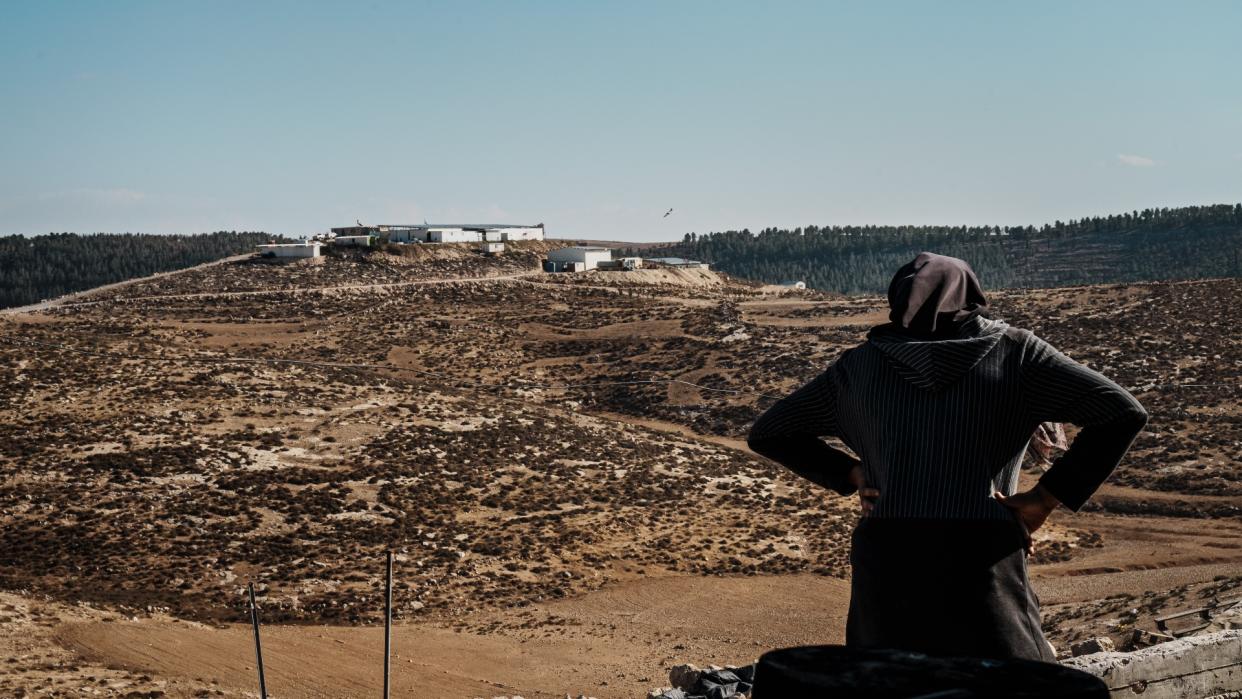How war in Gaza is impacting the West Bank

A coordinated campaign by Israel to "redraw the demographic map" of the West Bank is under way, rights groups in the Middle East are claiming.
With international attention fixed on the Gaza Strip, violence by Israeli settlers against Palestinians in the West Bank and East Jerusalem has more than doubled since Hamas's 7 October attack.
More than 700,000 settlers – out of Israel's total population of nearly 10 million – now live in 150 settlements and 128 outposts dotted across the occupied West Bank and East Jerusalem. Outposts are not authorised by the Israeli government but settlements are – although both are considered illegal under international law.
Despite this, Benjamin Netanyahu's far-right government has expanded settlement construction and treated the West Bank as part of a "Judea and Samaria" that Jews have a right to control.
Around 40% of the occupied West Bank land is now controlled by settlements. For the Israeli Jews who live there, these settlements – along with a vast network of checkpoints for Palestinians – "act as a buffer for Israel's national security as they restrict the movement of Palestinians and undermine the viability of a Palestinian state", said Al Jazeera.
What has changed since 7 October?
Last year was already the deadliest for Palestinians in the West Bank for two decades as settler groups have become bolder and the army has intensified its raids on Palestinian towns and cities. But since 7 October, when Hamas militants killed more than 1,400 Israelis in Israel, things have "dramatically worsened", said The Economist.
According to the United Nations Office for the Coordination of Humanitarian Affairs (OCHA), settler violence against Palestinians in the occupied West Bank and East Jerusalem has more than doubled from an average of three to almost eight incidents a day.
The number of Palestinians killed in the West Bank is now over 150 and is "rising dangerously fast", said The Economist, with the territory "getting closer to boiling over".
In recent weeks "elements of the army and those settlers who are bent on violence appear to have teamed up", Yonatan Kanonich of Yesh Din, an Israeli watchdog that monitors Jewish settlements in the West Bank, told The Economist.
For settlers and their supporters in the Israeli government, the war with Hamas has "provided a pretext for an ever more radical agenda of expropriation that has inevitably stoked growing violence", said The Guardian.
Far-right figures such as Israel's finance minister, Bezalel Smotrich, have used the crisis to demand the imposition of new "security zones" to be set up around Jewish settlements to create areas closed to Palestinians.
In the northern West Bank town of Huwara, where settlers went on a car and business burning rampage in February in response to the murder of two Israeli brothers by Palestinian gunmen, the reaction of the Israeli military to the 7 October attack has been to effectively shutter the town, impose a curfew and split it in two.
"It's like East and West Germany," said the city's mayor, Moeen Dmeidi. Residents are unable to cross from one side to the other, top up essential prepayment cards for water and electricity or buy basic food.
What could happen next?
Some claim that Israel's ultimate goal is to push Palestinians out of the West Bank altogether, or barring that concentrate them in large urban areas.
"Calls for a mass expulsion of Palestinians from their homes in both the West Bank and Gaza have proliferated since the war with Hamas began a month ago," reported Foreign Policy, in what rights groups say is "a process of mainstreaming deportation in the Israeli discourse".
Backed by the Israeli army, settlers are using the cover of war to intensify violence and intimidation of Palestinians in an "attempt to redraw the West Bank demographic map", said Dror Etkes, director and founder of the settlement watchdog group Kerem Navot.
In response, around 30 Israeli human rights groups have launched a joint appeal that the ongoing displacement of Palestinians in the West Bank should be stopped.
"In the absence of significant international pressure to calm things down, this will just accelerate," said Yehuda Shaul, co-director of Ofek: The Israeli Center for Public Affairs.
Should settler violence continue to escalate there are fears a single incident could spark a full-blown Palestinian reaction, even a third intifada.
"I smell blood in the West Bank," a veteran Palestinian security official said. "I don't know where it will be, but it is coming: the settlers are going to do something terrible."

